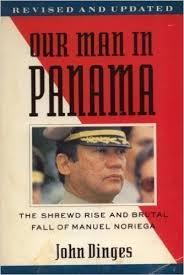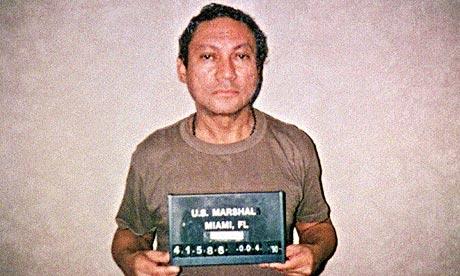Former Panamanian strongman Manuel Noriega remains unconscious in a Panama hospital after brain tumor surgery. Doctors say his prognosis is not good.
Noriega is 83 and he’s serving a prison sentence in Panama for murders he ordered during his military dictatorship in the 1980s. Until 2010, he was in a prison in Miami – where he spent 20 years for drug trafficking.
Noriega was the last of many Latin American dictators Washington partnered with – and then broke up with – during the Cold War. To oust him, the U.S. mounted an invasion of Panama in 1989.
John Dinges, a veteran journalist and Columbia University professor emeritus, wrote the 1990 book “Our Man in Panama: The Shrewd Rise and Brutal Fall of Manuel Noriega.” Dinges spoke with WLRN’s Tim Padgett from Washington D.C. to look back at Noriega’s dark legacy:
Excerpts:
WLRN: In “Our Man in Panama,” you write that Manuel Noriega “shied away from ever defining himself, as if he were a stellar black hole absorbing immense amounts of energy but reflecting no light.”

Dinges: Well, I was exercising some literary license there. What I’m referring to is the fact that Noriega had relationships with people of all ideologies. With clients, with enemies – a very close relationship with the United States but also with the Cubans. With the Sandinistas in Nicaragua, but also with the enemies of the Sandininstas, the contras.
Mainly he was an intelligence officer. He was somebody who took in information; gave out very little. Somebody who was paid by many but controlled by no one.
Why did he and Washington have such a close relationship?
He had a relationship with the CIA going back three decades. Panama, you have to understand, is a central information hub for all of Central America. And in that era, in the 1980s, you had several civil wars going on. So for example, surveillance of political leaders from the various countries in Central America – Noriega was in charge of all of that.
But he got into drug trafficking and for a period of time was quite important in facilitating trafficking with the Colombian drug cartel.
And Noriega’s drug trafficking was a big reason his relationship with the U.S. began to go south in 1983 after he seized power as Panama’s dictator.
The United States was starting to move against Noriega. He had manipulated elections; dissidents were being put in jail; there had been a couple murders of dissidents, the worst being his political opponent Hugo Spadafora. So the relationship deteriorated.
Noriega’s people, they say it wasn’t the drugs, [that] he basically had agreed to stop the drug trafficking. [They say] it was that Noriega no longer was willing to be what he called the tip of the spear for the U.S. in the fight against the U.S.’s enemies. And he says that’s what turned the U.S. against him.
LYING DOWN WITH DOGS
But you suggest he wasn’t as monstrous as Latin American dictators back then like Pinochet in Chile.
He was a brutal military dictator. But Noriega was definitely not in the top ranks of brutality. Nothing that we know is adequate to explain that extreme step that the United States took in 1989 to invade a country in order to prosecute a drug indictment against a head of state. And after all these years it still doesn’t make sense to me. Six hundred Panamanians died; 23 American soldiers died. That’s a pretty high cost to bring in a second-rate drug trafficker.
How important was Miami’s role in giving President George H.W. Bush the grounds for ordering the invasion?

The indictment from the federal prosecutor in Miami was quite solid. Noriega’s defense team said [that] even while he was doing the drug trafficking he was acting as an agent of the CIA. At one point one of the prosecutors said, “That’s classified information.” And the defense lawyer said, “We took it from John Dinges’ book, ‘Our Man in Panama.’” So it was nice they used my book.
The U.S. so often sides with dictators like Noriega in the name of geopolitical stability. But it so often backfires on us. What important lessons should we take from the Noriega tragedy?
Well, I guess you could say: You lie down with dogs, you rise up with fleas.
We represent to the world this shining light of democracy and respect for human rights. But when we support people like Noriega, what we’re saying to the world is that these values only hold forth inside the United States, not outside the United States. That torture, corruption, reprisals against dissidents, corrupt elections are going to be condemned only if it’s in the interests of the United States. And sometimes we will actually defend those practices if it’s in the interests of the United States.
